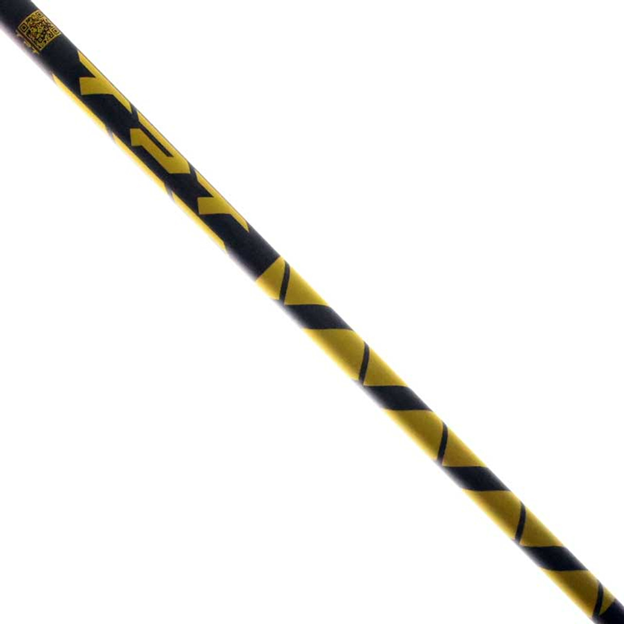Everything You Wanted to Know About TPT Golf Shafts
Posted by Dallas Golf on 27 Aug 2025
If you love marketing hype, you’ll love TPT golf shafts. But is it all hype? This article will take a closer look at the technology that drives performance behind these shafts.
Don’t run and buy custom golf clubs online just yet. Working with a fitter to choose the right shafts for you may get the job done just as efficiently - especially if it’s a TPT.
“No Spine” = More Consistent Sweet Spot Contact
Manufacturers of driver shafts are constantly looking for ways to up the bar. Stronger, higher density carbon fiber. Less epoxy in the prepreg. Improved stability and sensitivity. Enhanced energy loading. And so on and so forth - you get the picture.
With TPT golf shafts, it all comes down to the engineering and manufacturing processes. First, they start with a homogenous composite material from start to finish, minimizing minor aberrations the effects of which would be magnified throughout the process.
Then, they precisely control the angle of the fibers within the shaft, increasing consistency. At the same time, during production, they don’t allow angle off-axing.
Angle off-axing, which often occurs during the manufacturing of golf shafts, results in torsional bending and coupling which can affect the manner in which the shaft bends and twists when a golfer swings it. This, in turn, will create inconsistencies in how the clubface contacts the ball, resulting in - you guessed it - shot dispersion.
With TPT golf shafts, extreme precision during manufacturing eliminates angle off-axing and requires the use of exceptionally consistent materials. TPT has also engineered what they call “Continuous Fiber,” an automated golf shaft manufacturing process that enables them to produce extremely consistent - nearly identical - shafts, from batch to batch.
They’ve also developed a unique fiber winding process that enables them to improve winding consistency. This, in turn, ensures greater lightness along with blocked torque - they call this technology Nitro Pure Power, and it boosts both power and precision for players of all skill levels.
The founders of TPT golf shafts were also instrumental in the development of Thin Ply Technology that was originally used in the production of sails. When used in golf shafts, it results in a lighter, stronger, stiffer, more consistent shaft.
They have unlocked the secrets of the ultimate torque to weight ratio in their driver shafts, which in turn encourages golfers to swing more confidently. Their shafts also offer superior feel and feedback, which also boosts confidence.
Confidence encourages golfers to swing harder and faster - producing greater carry distance. But it doesn’t end there. Players that become more confident and swing harder, without experiencing greater shot dispersion, and may become comfortable enough to play with softer shafts, which can also add a few miles per hour to club head speed. This all comes with no extra effort required from the golfer, as a result of the superior energy transfer characteristics of most flexible shaft profiles.
Now let’s get to the crux of what TPT calls “no spine.” Their golf shafts are, to use a popular phrase, ‘built different.’
Playing with a shaft that’s not well matched to the golfer - either of the wrong stiffness, torque, bend profile, weight, or length - creates what is known as spine.
Spine is not a good thing. It is the collective term for all of the unwanted oscillations and aberrations that occur during a golf swing - otherwise known as wobble.
Wobble can create shot dispersion, and it can also adversely impact energy transfer. Golfers can feel it, too, and oftentimes, to try to go around it, they play with a shaft that’s stiffer or heavier to try to deaden it. But this is not the way.
The way is playing with a shaft that has no spine to begin with - such as a TPT golf shaft.
See, the thing about all of the processes and proprietary technologies mentioned so far is that they do just that. They eliminate spine. The precision processes, automation, and advanced materials do away with it, even in their softer flex profiles - and golfers notice how stable they are, again, even with the more flexible shafts.
The result is you don’t need to compromise by playing with a shaft that’s too stiff or too heavy. You get a TPT golf shaft that is, to use another popular phrase, ‘just right.’
Consistent shaft engineering, manufacturing, and optimized bend profiles take the swing the rest of the way, delivering more consistent impact, tighter shot dispersion, and higher club head and golf ball speeds for greater carry distance.
To use the terminology of TPT, their shafts are softer, sweeter, and speedier, and both high-launching and low-launching shaft profiles are available, to support the needs and preferences of a wider range of golfers.
On top of that, TPT golf has developed an automated process whereby they can create what are effectively identical shafts, even across batches, which means this: when you buy a TPT golf shaft, assuming it is properly fitted, if you ever by the same TPT shaft again, it will offer identical performance to its former counterpart.
Which means this: you only need to get fitted for a TPT golf shaft one time, and you’re set for life.

Better Than Getting Custom Golf Clubs Online: Working with a Fitter
If you didn’t get the picture yet, TPT golf shafts are basically better than getting custom golf clubs online. They’re engineered to meet the performance of a wider range of golfers, by their very nature.
There’s one catch, and it’s a small one. You need to get fitted to make sure you’re swinging the right one. We can help with that - call us at 800-955-9550 or visit us in our retail shop in Dallas.

